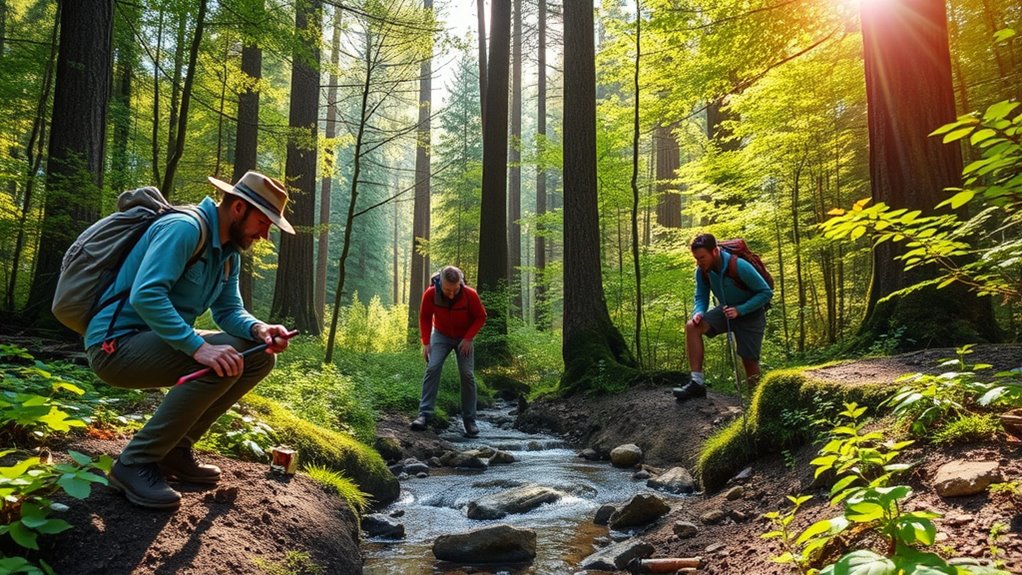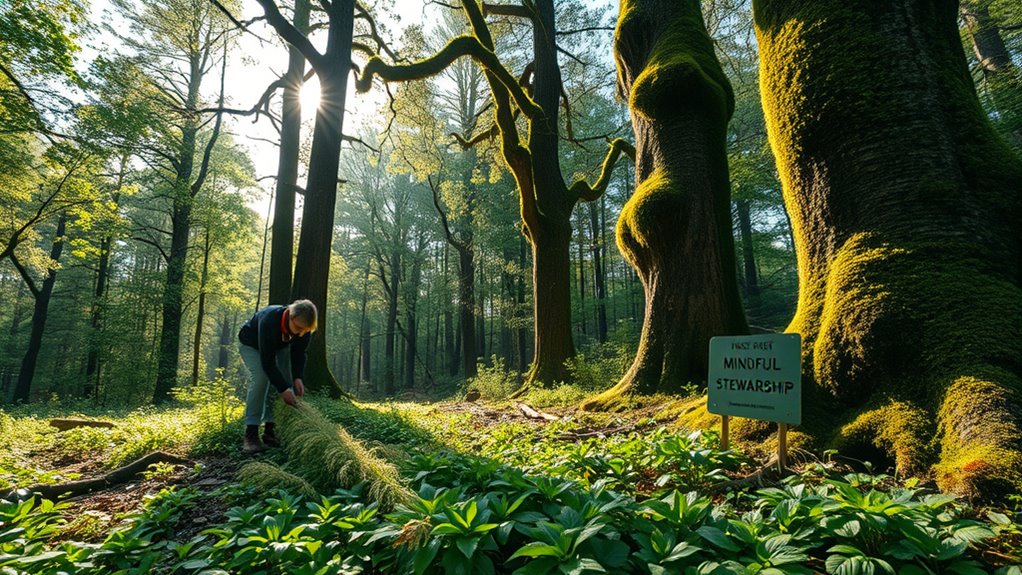To go beyond picking up litter and truly embrace Leave No Trace, focus on planning your trips carefully to minimize impact from the start. Stay on established trails, respect wildlife from a distance, and use existing campsites and fire rings whenever possible. Protect water sources by washing away from streams and using biodegradable soap. Practicing these principles helps preserve natural spaces and ensures future enjoyment—continue exploring to learn how to fully implement these practices in your adventures.
Key Takeaways
- Leave No Trace emphasizes minimizing environmental impact through ethical trail use, campsite management, and wildlife respect.
- Proper planning reduces resource overuse and prevents damage, extending beyond litter pickup to overall stewardship.
- Avoid creating new impacts like fire rings or trail widening by using existing sites and staying on established paths.
- Protect water sources by maintaining distance during cleaning and using biodegradable products to prevent contamination.
- Responsible behavior transforms recreation into conservation, ensuring natural areas remain pristine for future generations.

If you’re passionate about enjoying the outdoors responsibly, a deep understanding of Leave No Trace principles is essential. While many people think of litter pickup or sticking to designated trails as the main ways to reduce impact, true ethical hiking and minimal impact camping go far beyond that. It’s about making conscious choices that preserve the natural beauty and health of the environment for future generations.
One key aspect is planning ahead. When you prepare properly, you minimize your footprint by avoiding resource overuse and reducing the need for emergency interventions. Research the area, understand the regulations, and pack only what you need. This not only ensures a smooth trip but also helps prevent accidental damage or waste that could harm the ecosystem. Your goal should be to leave everything as you found it, or better, which is the core idea behind minimal impact camping.
When you’re out on the trail, practicing ethical hiking means staying on established paths and avoiding shortcuts that can widen trails, disturb plants, or cause soil erosion. It’s about walking lightly and respecting the habitat of wildlife. Keep noise levels down, too, so you don’t disturb animals or other hikers. If you encounter wildlife, observe from a distance and never feed them—feeding can alter their natural behaviors and make them dependent on humans. Using high-quality projectors for outdoor viewing can enhance your experience without disturbing the environment.
Campsite management is another critical aspect. Set up camp in existing sites when possible, and avoid creating new fire rings or clearing vegetation. Use existing fire pits and keep fires small, extinguishing them completely before leaving. When it comes to waste, pack out all trash, leftover food, and biodegradable waste like fruit peels—these can still attract animals and disrupt local ecosystems. If you’re camping in an area that allows for it, opt for minimalist gear and practices, which contribute to minimal impact camping. This means using lightweight, eco-friendly gear, and minimizing your footprint by sticking to designated campsites and avoiding large disturbances.
Water sources require special attention. Use established routes or designated water collection points, and avoid contaminating streams or lakes by staying at least 200 feet away from water sources when washing or cleaning dishes. Bring biodegradable soap and wash away from water bodies to prevent pollution.
Living by these principles transforms your outdoor experience from just recreation into a meaningful act of conservation. Ethical hiking and minimal impact camping aren’t just rules—they’re a mindset that keeps nature pristine and accessible for everyone. When you embrace this responsibility, you’re helping to protect the very places that bring you joy, ensuring they remain vibrant and alive for generations to come.
Frequently Asked Questions
How Can I Educate Others About Leave No Trace Principles?
You can educate others about Leave No Trace principles by engaging your community through activities like workshops or cleanup events. Use digital awareness by sharing informative posts, videos, and stories on social media to reach a broader audience. Encourage open discussions and lead by example, demonstrating responsible outdoor behaviors. By combining community engagement and digital tools, you’ll inspire others to adopt sustainable practices and protect natural spaces effectively.
What Are the Most Common Misconceptions About Leave No Trace?
Ever wonder what myths about Leave No Trace still persist? Many believe it’s just about litter pickup, but myth debunking shows it’s about respecting nature’s integrity. People often think small impacts don’t matter, yet ethical responsibilities demand minimal disturbance. Common misconceptions include thinking fires are always harmful or that invisible footprints are harmless. Recognizing these false beliefs helps you act responsibly, preserving outdoor spaces for future generations and fostering true environmental stewardship.
How Does Leave No Trace Impact Wildlife Conservation Efforts?
You might not realize it, but practicing Leave No Trace greatly benefits wildlife conservation. It helps maintain wildlife corridors and habitat preservation by reducing human impact. When you leave no trace, you’re preventing habitat destruction and fragmentation, allowing animals to safely move and thrive. Your actions support healthy ecosystems, ensuring that wildlife continues to flourish, and preserving natural spaces for future generations to enjoy and study.
Can Leave No Trace Principles Be Applied in Urban Environments?
You can definitely apply Leave No Trace principles in urban environments by practicing good urban etiquette during city cleanup efforts. This means you’re mindful of your impact, disposing of waste properly, minimizing noise, and respecting public spaces. By doing so, you help keep the city clean and inviting for everyone. Your efforts contribute to a cleaner environment, promote community pride, and encourage others to adopt sustainable habits, making urban areas healthier for all.
What Are the Challenges in Implementing Leave No Trace Practices Globally?
Implementing Leave No Trace practices globally faces challenges like cultural barriers, where local customs may conflict with these principles. Economic incentives often prioritize short-term gains over environmental care, making sustainable behaviors less attractive. You might find that raising awareness and adapting strategies to respect diverse cultures can help. Overcoming these hurdles requires collaboration, education, and policies that align economic incentives with environmental stewardship, ensuring everyone can participate effectively.
Conclusion
By following Leave No Trace principles, you’re helping preserve nature for future generations. Did you know that over 80% of outdoor areas are impacted by human activity, often unintentionally? Your actions—like packing out trash and staying on trails—make a real difference. When you commit to these practices, you’re not just keeping nature beautiful; you’re protecting ecosystems and wildlife. Every small effort counts, so keep the mindset of leaving no trace wherever your adventures take you.










